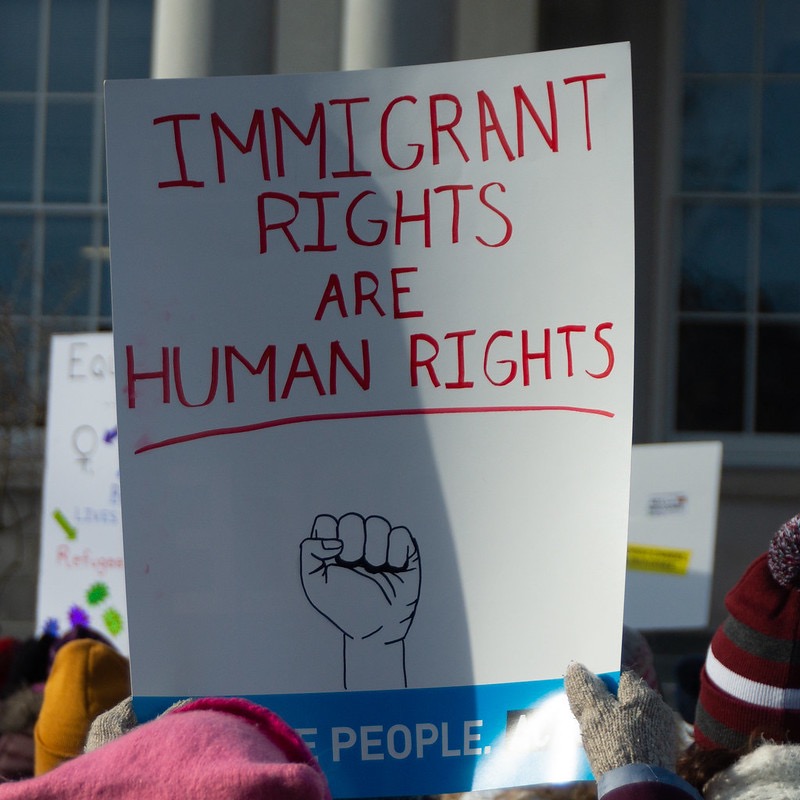The enforcement of a return decision is a controversial and complicated undertaking, with potentially far-reaching implications for returnees. Currently, only a fraction of migrants with a return decision are in fact removed from the EU (Eurostat 2023). Instead, many have become stuck in (legal) limbo for extended periods (sometimes spanning years), as authorities struggle to enforce their return due to persisting barriers (Mezenes Queiroz 2018). While the reasons for situations of non-return are complex and diverse, my research focuses on cases involving practical and legal barriers to removal. On a practical level, removal may be impeded by difficulties in obtaining new identification documents from the country of origin (Schoukens and Buttiens 2017)1. From a legal perspective, removal may be barred due to refoulement concerns or the right to respect for family life (Eckert 2021).
 © Public Domain, no attribution required
© Public Domain, no attribution required
While their removal is suspended, migrants may find themselves in a legal grey zone. Authorities typically continue to view them as prospective returnees, which in turn affects their ability to access crucial services, such as healthcare, accommodation and social security (EMN 2021:8). Equally, the uncertainty surrounding prospective removal increases the risk of prolonged and potentially unlawful detention (Vanderbruggen et al 2014). The exact scope of rights available to unreturnable migrants differs between EU member states2. For example, while some countries (e.g. Poland) grant non-removable migrants the right to work, others deny access to the labour market to ‘discourage irregular stay’ (EMN 2021). Some states, such as Germany, reserve access to employment to those deemed ‘cooperative’, while migrants suspected of obstructing their own removal are subject to a number of sanctions (including exclusion from the labour market and restrictions on movement) (Ibid).
In practice, many unreturnable migrants experience difficulties in exercising their rights. This is particularly true if they have not received an official certificate acknowledging the postponement of return (EPRS 2020:75, EMN 2021:8)3. In such cases, access to services and housing may depend on discretionary decision-making and vulnerability assessments (EMN 2021:20). In contrast, greater legal certainty has been documented in countries that grant migrants temporary residence permits or ‘toleration status’ (Heegard Bausager et al 2013:77). Also known as ‘tolerated stay’, this official status formalises the suspension of removal proceedings and ensures access to public services. In some countries it does not, however, amount to a fully-fledged residence permit (e.g., Germany, Austria).
Data indicating the exact number of ‘unreturnable migrants’ across Europe is notoriously difficult to establish (Schoukens and Buttiens 2017:315). Estimates based on the discrepancy between issued return decisions and enforced returns have been used to assess the scale of the issue, but risk being inaccurate. Indeed, some cases of ‘non-return’ may be linked to limited resources, rather than complex barriers to return. Recent data from Germany, however, highlights the protracted nature of situations of unreturnability: In 2022, around 136 000 individuals have had their removal suspended for at least five years and their toleration status consecutively renewed.
While the barriers to removal persist, the tension between states’ migration control objectives and migrants’ claims to secure residence rights grows. Throughout these periods, most EU member states remain focused on clearing the barrier to return and do not consider regularisation a policy priority, not least due to its ‘politically contentious nature’ (Desmond 2021; EMN 2021:7).
Nonetheless, in recent years some countries have demonstrated greater receptiveness to regularisation policies (in some instances fueled by public health considerations during the Covid-19 pandemic) (Desmond 2021). Last year Germany adopted legislation, which expands access to residence rights for long-term tolerated migrants. The new regulation offers migrants, specifically those who have been tolerated for at least five years prior to 31st October 2022, an initial short-term residence permit, valid for 18 months. After this permit expires, they may qualify for longer-term regularisation, provided they meet the requisite conditions.
For years, scholars have highlighted the many benefits of regularisations. In the case of unreturnable migrants, the arguments in favour of regularisation are particularly strong: access to secure residence rights not only offers migrants a way out of limbo and chronic uncertainty, but also protects them against exploitation and other human rights violations. From a legal perspective, regularisation may also be warranted to respect migrants’ right to private and family life (Klaasen 2020).
 © Flickr.com
© Flickr.com
1 Other practical barriers include the lack of transport capacity, lack of cooperation of the country of origin (some countries only accept voluntary returns) and absconding (EPRS 2020).
2 The Returns Directive (2008/115/EC) superficially touches on the rights of migrants, whose return has been postponed in Article 14, which mentions inter alia - basic healthcare and access to education for children. Yet, in practice, these so-called ‘safeguards’ fail to afford sufficient protection to unreturnable migrants.
3 In several EU member states (Belgium, Bulgaria, Spain, France, Italy and the Netherlands) there is no official acknowledgment of the (temporary) impossibility of return (EPRS 2020).
References
Desmond, A. (2021), The Possibility for Regularisation in the UK in Light of the New Plan for Immigration, Refugee Law Initiative Blog.
Eckert, G. (2021), Caught in limbo: the precarious (legal) situation of non-removable migrants stranded in Europe, Journal of Immigration, Asylum and Nationality Law 35(3), 252-277.
European Migration Network (2021) Responses to long-term irregularly staying migrants: practices and challenges in the EU and Norway.
European Parliamentary Research Service (2020) The Return Directive 2008/115/EC: European Implementation Assessment.
Heegaard Bausager et al (2013) Study on the situation of third-country nationals pending return/removal in the EU Member States and the Schengen Associated.
Klaasen, M. (2020), The right to regularise irregular residence is a human right, Leiden Law Blog.
Menezes Queiroz, B. (2018), Non-removable Migrants in Europe: An Atypical Migration Status? European Public Law 24, 281, 296.
Schoukens, P. and Buttiens, S. (2017), Social protection of non-removable rejected asylum-seekers in the EU: A legal assessment European Journal of Social Security 19(4), 313–334.
Vanderbruggen et al (2014) Point of no return: The futile detention of unreturnable migrants.

Gianna Eckert is a PhD student at the University of Bristol Law School. Her research is concerned with forced removals and their human rights implications. In particular, her PhD project examines cases in which return cannot be carried out due to persisting legal and practical barriers. Focusing on the UK and Germany, and employing a socio-legal approach, Gianna explores how both countries manage cases of protracted ‘non-return’.
